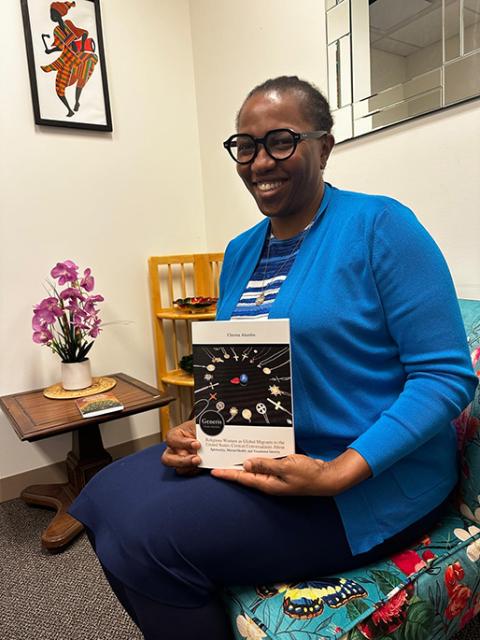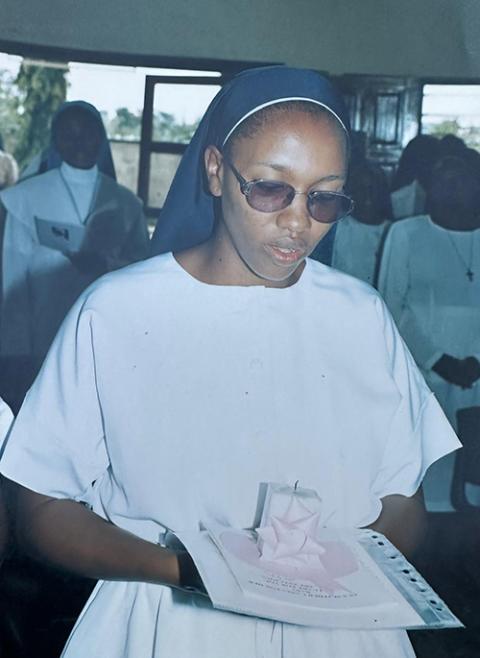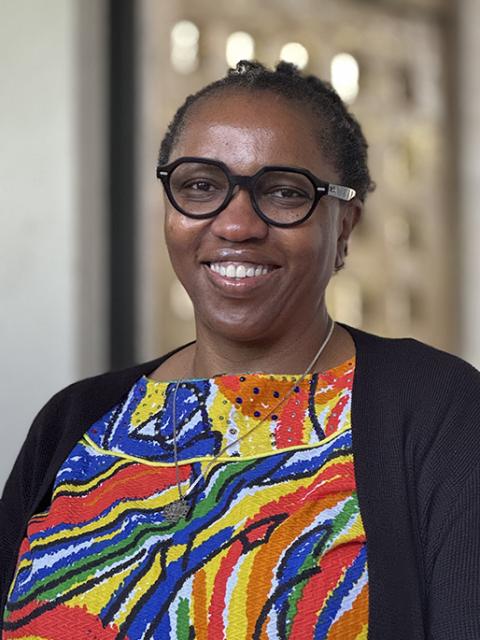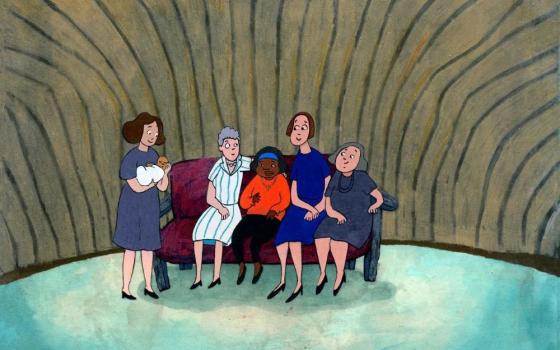
Sr. Chioma Ahanihu takes notes March 27, 2025, in Mexico City at the start of a gathering for sisters involved in data collection. Ahanihu is director of the Center for the Study of Consecrated Life at the Catholic Theological Union in Chicago. (GSR photo/Rhina Guidos)
There have been many surprises in Sr. Chioma Ahanihu's life but the two things she was certain of early on is that she wanted to be a sister and she wanted to do that outside of her native Nigeria.
So, it should be no surprise that those two things are at the heart of her research as a scholar and theologian. Her doctoral dissertation about the journey of sisters who leave their home countries to serve elsewhere turned into the newly published Religious Women as Global Migrants to the United States: Critical Conversations About Spirituality, Mental Health, and Vocational Identity.
In it, she explores the sustainability of religious congregations "that do not maintain a presence in the Global South" and what it means for the future of those communities in the U.S.

In this undated photo, Living Word Sr. Chioma Ahanihu poses with her newly published book Religious Women as Global Migrants to the United States. (Courtesy of Sr. Chioma Ahanihu)
"How can these communities sustain themselves amid the ongoing decline in membership? What are the broader implications of this trend for consecrated life in general?" The book seeks to answer these questions.
Ahanihu, a member of the Sisters of the Living Word, has served as a social worker, a psychotherapist, and now is director of the Center for the Study of Consecrated Life at the Catholic Theological Union in Chicago, the institution where she earned her master's and a doctorate degree.
"I've been living in the U.S. now for over two decades, and it's been a tremendous and joyful experience serving God's people here in the U.S. and beyond the U.S., I would say, because it started in Nigeria," she said.
It was in Nigeria where her friendship with a sister fueled her dreams of consecrated life. She was sent to the U.S. to study and serve. And though she took her first vows 25 years ago with a different congregation and had a robust ministry, questions and then discernment about the future began. She made a decision to leave the community but still wanted to be a sister.
"My story is not one that is linear. I don't know whose story is linear," she said. "But my story has some bumps and some high points and all that. In all, it has been a wonderful experience."
In an interview with Global Sisters Report, she spoke about those bumps that have paved the way for surprises.
Global Sisters Report: Can you tell me a little about that bump that you had in between communities?
Ahanihu: Oh, yes. I became a sister at 24. … It was at that point I became an immigrant here, experiencing a new culture, going through academics here, not really having any family here. I have a few distant [relatives] who were very far away.

In this photo from 2000, Sr. Chioma Ahanihu professes her first vows with the Missionary Sisters of the Holy Rosary in Enugu, Nigeria. (Courtesy of Sr. Chioma Ahanihu)
I was thinking about life, really broadly: "Is this all that I'm going to do? Is this the whole life for me?" and all that. After a lot of thinking and reflection and guidance, meeting with a spiritual director, going through the pros and cons of continuing on with religious life, it got to the point that I bowed out. I said to my previous congregation, "I think at this point, I don't feel called to continue on in religious life with you."
At that time, even having the courage to say it wasn't easy. It took time for me to get to that point, a lot of prayers and discernment and talking. That was a big bump for me. God saw me through it — and friends and family.
Nothing good comes easy. You have crying moments at times.
Do you think those bumps have helped?
I think everybody makes changes in life, no matter who you are and all that, because one cannot be stagnant. Working at CTU, yes, it has helped me to grow, being a director for Center for the Study of Consecrated Life, which does research and all that.
It has helped me also tremendously, especially even in my academic life, because it was working here that I was able to hone that area of research that I wanted to go into as I was studying for my doctoral program.
Advertisement
Can you tell me a little bit about your job at CTU?
The goal of the center is to engage in research and dialogue in contemporary issues for consecrated life today. That translates into working with sisters, with different congregations, one-on-one, to discuss about their lives and what's going on today and all that.
Currently, the group of sisters that I'm working with are from the National Black Sisters' Conference. Not all the congregations signed up to this project, but there is a sizable amount of them that we've had in these past three years. We've had a symposium. We've had educational sessions, and we've had retreats where we have talked about issues of racism and transformative justice. How is it applicable in your community? How is your community aware of racism in the community? And what are you doing as a community to continue to eradicate systemic injustice in the U.S. and in the world?
When you first set out to become a sister, did you ever imagine that you'd be in this role?
Not really. The only thing I really imagined in my life as a sister is that I really wanted to work not in my country of origin. I wanted to be out in the world helping people. I didn't know how that would translate, but I know that that's what I imagined for myself: working with people outside of Nigeria, outside of my state where I was born. Other than that, I didn't have any idea of what I'd be doing now at my age, now at 51. God continues to surprise me.

Sr. Chioma Ahanihu poses for a photo March 27, 2025, in Mexico City at the start of a gathering for sisters involved in data collection. (GSR photo/Rhina Guidos)
How does your vocational, as well as your international experience, express itself in your work?
My ministry with people had been working as a therapist. Some realized I'm a sister. They didn't see me immediately as a sister because I don't wear a habit all the time. But in my conversations with people, sometimes it came up with people asking, "Can we have spiritual direction with you, spiritual accompaniment?" and all that.
That led me into desiring to study more spirituality and theology. My community's leadership agreed and I enrolled at CTU and got another master's in pastoral studies and I finished it up with a practical theology degree, doctorate degree. The center really has helped me in defining who I am and what my area is at this time, which is to continue to address global sisters' issues.
I coined the word "global migrant sisters" as I was developing this research. I interviewed a good number of sisters in the process. These sisters were all born in other parts of the world, and they belong to religious congregations here in the U.S. In my interviews with them, they shared stories about their lives being here. Most of them are minorities in their congregations. That has shaped them in relation to their spirituality, their mental health, issues with racism, vocational identity, as they respond to God's call.
Religious life has been wonderful to me. I've lived the best of life because I didn't anticipate it was going to be like this. It's been wonderful. I know for some people, sometimes they don't understand our lives because it's a life very countercultural to today's world.
They ask questions: "How do you live in community with other people who you don't even know?" and all that. Or "How do you live alone as a sister doing what you're doing, going places, answering, responding to God's call in those things?" But I guess that's where God shows God's power in us, his love also.
And you have the added element of leaving your country. What was that like?
I think that was where I got my grace, because leaving home, leaving my family and friends and all that. Initially, it wasn't easy, even though I had desired this, even before I became a sister. But when the time came, and it came really quickly for me, the anxiety, the fear of "I'm going to a different land."
The good thing is that coming here, the sisters prepared me to an extent and said, "This is what you're going to" and "You're going to experience this," but still, it is not the same as experiencing it yourself.
But it worked out well. I came with another sister. When we came, we started school at Misericordia University in Pennsylvania. I remember the first day that we went to that school … somebody started running after us, saying, "Hi, sisters." I'm like, "Who is this person running after us?" It was the president of the school. He heard that sisters had arrived from Nigeria and he came to see us. I'm like, "Wow." You're seen for who you are, for just being a human being like others. That helped calm the anxiety and the fears of starting school in a foreign land.
The school Misericordia is owned by the Mercy Sisters and they [the sisters] would always stop by and say, "How are things going?" telling us about snow.
It was so magical for me because I've never had an experience of snow. These are the first experiences I can remember of leaving home and coming to a foreign land.
In my role at CTU, I have tried my best to help those sisters adjust to the reality of being here. I have taken them to a store to pick up their first winter jackets or boots and gloves and all that, taking them to an African store here so they could pick up something similar to what they are used to back home.
This role as a director has helped me to help other sisters adjust to being in a different land and different culture, a different way of life.





